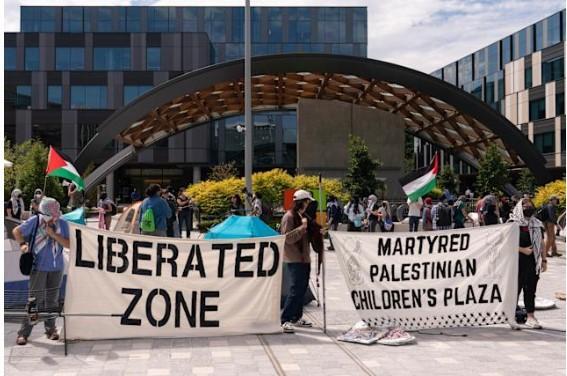
Microsoft Asked FBI to Track Pro-Palestinian Protests, Fired Staff
The ongoing conflict between Israel and Palestine has sparked widespread protests and activism across the globe. In the midst of this turmoil, technology giant Microsoft has found itself at the center of controversy. According to a recent report by Bloomberg, Microsoft sought the help of the Federal Bureau of Investigation (FBI) to monitor pro-Palestinian activism, suspended and fired dissenting employees, and increased security at events. This move has raised concerns about the role of technology companies in conflict zones and the limits of workplace activism.
The protests in question began in May 2021, amid the Gaza war, when Microsoft employees demanded an end to contracts with Israel. The employees, who identified as supporters of the Palestinian cause, argued that the company’s ties to Israel were complicit in human rights abuses and war crimes. Microsoft, which has a significant presence in Israel, had previously been criticized for its silence on the issue.
In response to the growing protests, Microsoft approached the FBI with a request to monitor the activities of pro-Palestinian groups. The company sought the FBI’s assistance in tracking the movements and communications of employees who were participating in the protests. This request has been widely condemned as an attempt to stifle free speech and intimidate employees who are exercising their right to protest.
The FBI, however, declined to comment on the matter, citing the need to protect sensitive information. Microsoft, too, refused to comment on the specifics of its request, stating only that it was committed to creating a safe and respectful workplace for all employees.
Despite the company’s efforts to monitor and silence the protests, the demonstrations continued unabated. Employees who had been suspended or fired for their involvement in the protests have spoken out about the intimidation and retaliation they faced. Many have reported being subjected to verbal abuse, harassment, and even physical threats from colleagues and supervisors.
The fallout from Microsoft’s actions has been severe. The company’s reputation has taken a significant hit, with many employees and customers expressing outrage and dismay at its handling of the situation. The incident has also sparked a wider debate about the role of technology companies in conflict zones and the limits of workplace activism.
Microsoft’s actions have been widely criticized by human rights groups and activists, who argue that the company’s ties to Israel are complicit in human rights abuses and war crimes. The company’s silence on the issue has been seen as a tacit endorsement of Israel’s actions, and its efforts to silence employees who are speaking out against the conflict have been condemned as a form of corporate bullying.
In a statement, Microsoft said that it was committed to creating a safe and respectful workplace for all employees, but critics argue that this commitment is hollow in the face of the company’s continued ties to Israel. The incident has raised important questions about the role of technology companies in conflict zones and the limits of workplace activism.
As the conflict between Israel and Palestine continues to rage on, the world is watching to see how technology companies like Microsoft will respond to the calls for action. Will they continue to turn a blind eye to the human rights abuses and war crimes committed by Israel, or will they take a stand and support the rights of the Palestinian people?
The incident at Microsoft serves as a stark reminder of the importance of corporate social responsibility and the need for technology companies to prioritize human rights and social justice. As the world becomes increasingly dependent on technology, it is crucial that we hold these companies accountable for their actions and ensure that they are not complicit in human rights abuses and war crimes.
Source: https://www.breezyscroll.com/world/microsoft-fbi-palestinian-protests/






